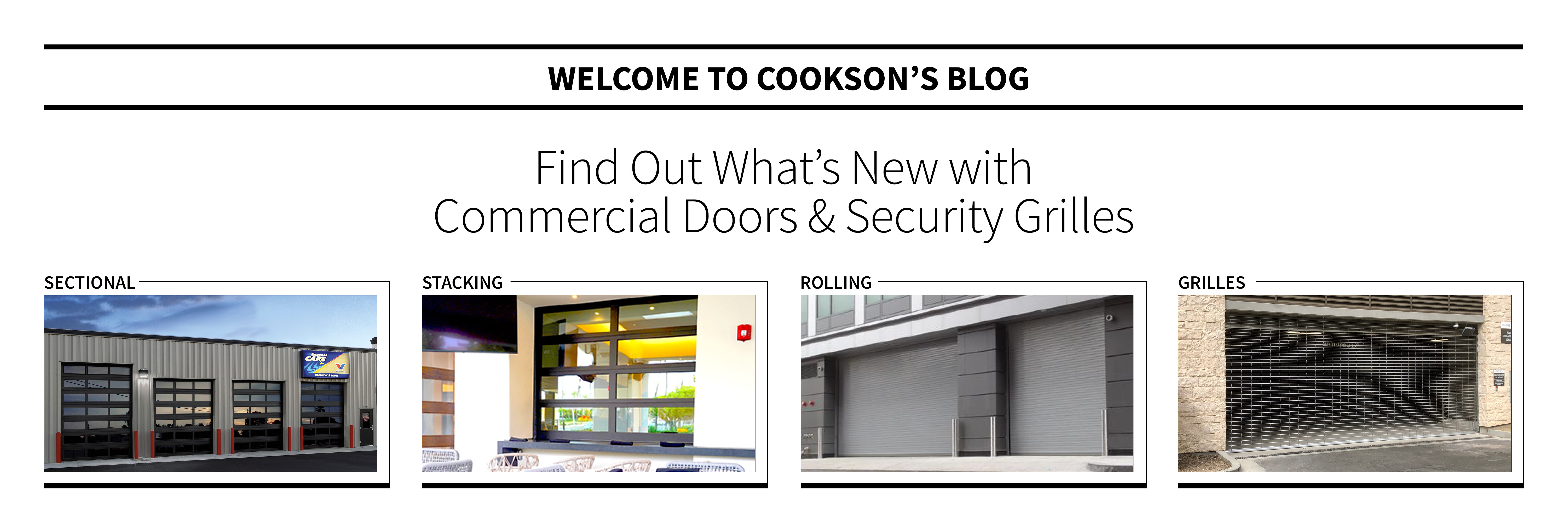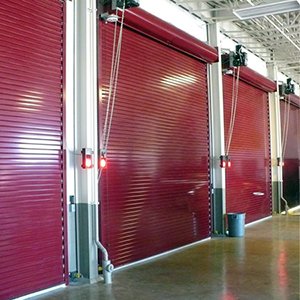

Cookson Blog
Welcome to the Cookson Blog! - Roll Up Door and Security Grille news - What's New?
SUBSCRIBE
Get updates on new blog posts to your inbox!
The Difference Between R-Value & U-Factor for Roll Up Doors
Are you looking for a roll up door? When selecting a good fit for your needs, there are a few factors you need to keep in mind, including the “who, what, where, when, why, and how” of the door and the vital thermal resistance factors: R-value and U-Factor. When selecting a roll-up door, consider:
- Who will be using the door? In what kind of facility will it be placed?
- What are the door’s most important attributes? Does it need to be a high performance door or an insulated fire door?
- Where will the door be placed?
- When will the door be used the most?
- Why is a door needed in that particular area?
- How will the door be used?
While the questions above are standard ones you may ask yourself when choosing a roll-up door, one question people may tend to forget is if the door also needs a certain level of thermal resistance.
Thermal resistance in roll-up doors: What is it?
Thermal resistance may be the last thing on your mind when selecting a roll-up door, but you should consider it. If you ignore thermal resistance and air leakage, they can drastically reduce the energy performance of your commercial garage door choice and garage door insulation, especially when closed. R-value and U-factor are two terms to know when talking about thermal resistance.
The importance of R-value for roll-up garage doors.
R-Value is usually seen as a straightforward measurement in regards to thermal resistance. However, R-value is sometimes misunderstood. The technical definition of R-value is “the inverse of the time rate of heat flow through a body from one of its bounding surfaces to the other surface for a unit temperature difference between the two surfaces, under steady state conditions, per unit area.”
While a somewhat unhelpful definition for those of us who aren’t highly technical, this definition encapsulates R-value. Here's a better definition: the R-value measures how an insulating material resists heat flow. The higher the R-value on a roll-up door, the greater its insulation power.
People often think that garage door R-value is the only thing they need to take into account when determining an insulated coiling door’s energy efficiency. But there is more to consider.
While the R-value can accurately measure wall insulation effectiveness, it isn’t the greatest for figuring out how well-insulated a product with multiple components is. So, when you see an R-value for insulation on a garage door, this only refers to the slat cavity’s resistance to heat transfer.
It’s like wearing a thick pair of wool gloves to protect your hands while wearing a tank top and shorts in the bitter cold. The insulation (a thick wool glove) is excellent for your hand, but leaving roll-up door guides, head, and hood out of the equation (with improper seals) is like disregarding other body parts in 10-degree weather.
Imagine the amount of “air leakage” you’d feel in this scenario, and it sums up what this means for a roll-up door in a similar situation: the R-value is null and void. R-value is a calculated but untested measurement. This means a roll-up door isn’t tested as a whole or a complete assembly. Other essential items left out of the measurement of R-value are the seal around the door guides, head, and hood.
 Why U-Factor for roll-up garage doors matters
Why U-Factor for roll-up garage doors matters
Garage door U-factor measures the heat transfer rate and is appropriately applied to the thermal efficiency of windows. This is because, similar to garage door insulation, windows are assemblies with multiple components.
Where R-value is only calculated, U-factor is tested. The tested value in U-factor is one of heat transfer via conduction and radiation, making it a better energy performance indicator than R-value.
Along with being independently tested, U-factor also tests the entire door assembly, unlike the calculations done for R-value, which only include a single component. Whereas a high R-value is good news, in the case of U-factor, the lower the number, the better. U-factor is an overall better measure of your commercial garage door and its insulation because it takes everything into account.
Discover our leading insulated commercial roll-up doors.
Minimizing energy transfer and air leakage is easy with our state-of-the-art insulated commercial roll-up doors, each engineered with an R-value and U-factor that offers heat flow reduction and is suited to most climates.
Choose from our trusted insulated roll-up door solutions.
When you're on the hunt for an energy-efficient overhead garage door, our broad range of insulated roll-up doors offers several quality options, including:
- Insulated overhead doors for corrosive environments: The ultimate in durability, our corrosion-resistant insulated overhead doors provide peak climate control, enhanced protection of people and products, and resistance to corrosion in harsh environments.
- Firemiser insulated roll-up fire doors: Our Firemiser insulated roll-up fire door delivers comprehensive fire protection and the benefits of mineral wool-based insulation, automatically closing and isolating smoke and flames in the event of a fire.
- Thermiser Max® insulated overhead doors: Lauded by leading architects and designers, our Thermiser Max insulated roll-up door is the pinnacle of energy efficiency and climate control, comprising foamed-in insulation and two layers of steel for optimal security.
- Thermiser® insulated roll-up doors: Another sterling example of roll-up door energy efficiency, Thermiser insulated overhead doors offer a secure barrier to the elements with foamed-in insulation and our patented sealing system along its perimeter.
Explore our robust high-performance insulated roll-up doors.
If you need an efficient system allowing for frequent open and close cycles, our high-performance insulated roll-up door selection offers a hear-wearing, low-maintenance, energy-saving, and secure solution, comprising the following options:
- Extreme® 300 Series insulated high-performance roll-up doors: Minimize air infiltration and maximize energy efficiency and productivity with our Extreme 300 Series high-performance overhead doors, offering improved speeds, operational efficiency, and up to 300,000 maintenance-free open and close cycles.
- Extreme 1024 Series insulated high-performance overhead doors: Delivering a staggering 1,000,000 maintenance-free open and close cycles, our insulated Extreme 1024 Series high-performance roll-up doors give businesses the utmost protection against the elements.
Find insulated roll-up door solutions for counters.
Made to spec, our tailored insulated counter doors create a service window and counter barrier, providing a high degree of security, protection against the weather, and temperature control.
Secure a good R-value and U-factor fit for your commercial needs.
As the principal manufacturer of world-class insulated roll-up garage doors with over 80 years of experience, we bring you industry-leading solutions that support and enhance your choices. Discover and create your custom insulated roll-up door through our feature-rich Architectural Resource Center, or find a Cookson door dealer near you to browse the range. For more information, contact us online to discuss your requirements.
For more information on insulated roll up doors and the most energy efficient commercial doors in the industry, contact us today. We can help explain the benefits and assist you with solving any complex problem with our rolling door solutions.

Cookson continues to lead in innovations in roll up door, security gate and closure products. To inquire how Cookson’s experts and customer service can help you with your next roll up door project, call 1-800-294-4358





